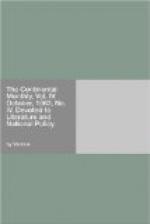The press of the United States has always been free to the extent that it might publish whatsoever it listed, within certain limits prescribed by the law. The press may still do this. But the nature of the law which prescribes the limits has changed with the times. The constituted authorities of the people of the United States are obliged now, in the people’s interest, to employ the processes of summary rather than those of routine law. Hence when the press infringes too violently the boundaries indicated, and persists in so doing, the sterner penalty demanded by the dangers of the hour is enforced by the sterner method likewise rendered necessary. So long as Executive action concerning the press shall be in accordance with the general sentiment of the people, it will be within the strict scope of the highest law of the land. Should the Executive persistently exercise this summary law in a manner not countenanced by the nation, he is amenable to it under the strict letter of the Constitution for high crimes or misdemeanors, not the least of which would be the usurpation of powers not delegated to him by the people.
The Executive of the United States occupies at this time an exceedingly trying and dangerous position, which demands for him the cordial, patient, and delicate consideration of the American nation. He is placed in a situation where the very existence of the republic requires that he use powers not technically delegated to him, and in which the people expect, yea, demand him, to adopt methods transcending the strict letter of statute law, the use of which powers and the adoption of which methods would be denounced as the worst of




